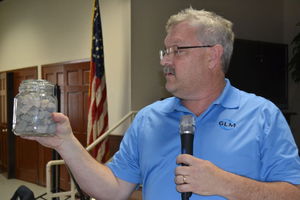
ASHLAND Working quietly behind a stand of trees in the Wurtland Industrial Park, Great Lakes Minerals specializes in making little rocks, and even powders, from bigger rocks imported from China and South America, Ashland Rotary members learned Monday while hosting guest speaker Larry Anderson.
вҖңWeвҖҷre a refractory company,вҖқ Anderson said, explaining the privately-owned local company has 26 employees and contributes an estimated $11 to $12 million to the local economy with operations including barge imports and offloading, payroll and trucking expenses.
The company imports bauxite, a form of aluminum ore, Anderson said, shipping 120,000 tons of the raw material from China and South America due to the fact the resource is practically depleted in America. The bauxite rocks, which must be kept dry, are shipped to New Orleans where it is loaded onto barges and transported up the Mississippi River to the Ohio River, where it is unloaded for further processing at the Wurtland facility. The materials must be kept dry, he explained, because moisture levels become critical when dealing with molten metals.
The plant in Wurtland crushes the bauxite rocks into smaller alumina ball, grits and powders used by other companies to make things like brick, blasting media and refractory linings, usually in relation to steel production. The companyвҖҷs crushed bauxite is also used to manufacture вҖңbrown fused aluminaвҖқ for purposes including grinding wheels and other abrasives.
Anderson said this area once had several thriving refractory clay businesses, although refractory clays became obsolete when industries adopted continuous casting techniques because the constant, high heat caused the clay to break down.
The crushed and sized material manufactured in Wurtland is then used by other companies for a variety of purposes, including grit for Black & Decker sandpaper discs, he said, and is often heated to 1,600 degrees (Celsius) to make a molten material which can then be further processed.
Noting the local plant was built in 1999, Anderson said he moved here in 1986 just as the area was entering an economic slump, including the local departure of Ashland Oil. Tough times followed, he said, although he believes the Tri-State is now showing signs of recovery.
вҖңItвҖҷs the whole Tri-State, not just Ashland, Huntington and Ironton,вҖқ he said, citing recent expansions including EN Engineering as well as developments at The Pointe. Anderson said he lives in Ironton, but typically eats in Ashland. Noting the number of Boyd County license plates he sees in the parking lot at IrontonвҖҷs new Big Boy restaurant, Anderson the local economies are obviously intertwined.


 Kupper
Kupper